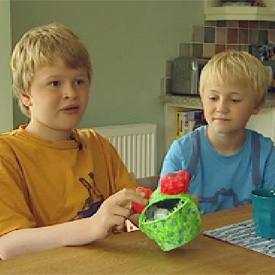New drug raises hopes for Duchenne muscular dystrophy fight
A drug that works as a “molecular patch” is providing new hope to sufferers of a deadly muscle wasting disease.
Seven out of 19 children with Duchenne muscular dystrophy have responded to a new injectable drug, according to clinical trials.
The condition affects one in 3,500 new-born boys, with around 100 new cases diagnosed in the UK each year.
What is DMD?
Those who suffer from the hereditary disease lack the vital muscle protein dystrophin, which is found in muscle fibres.
This genetic problem on the X chromosome problem causes the progressive breakdown of cells, resulting in severe disabilities.
By the age of 12, boys with DMD are often unable to walk and from their teens, they can experience breathing difficulties due to muscle wastage.

Molecular ‘bridge’
While the new treatment is not a cure, researchers believe it can prevent further muscle wastage.
The “antisense” drug, known as AVI-4658, is a synthetic form of the genetic chemical RNA.
It acts as a “molecular patch” to enable two working sections of a jumbled genetic code to work together.
Professor Francesco Muntoni who worked on the study at the Institute of Child Health in London described the new treatment as a breakthrough.
“These molecular patches allow the two sides of the ‘bridge’ to come together.
“This is the first time that a drug or genetic therapy has had a systemic effect in DMD so that every muscle is targeted.
“These are very exciting results that prove the case for an even more detailed look at this genetic therapy.”
These molecular patches allow the two sides of the ‘bridge’ to come together. It’s the first time a drug has had a systemic effect in DMD so that every muscle is targeted. Professor Franceso Muntoni
Brothers Jack, 11, and Tom Bosanquet, eight, took part in the 12-week trial at London’s Great Ormond Street Hospital.
Their mother Claire, said: “We felt from the outset that by taking part we were getting some control over something which for so long had been completely out of our hands.
“Our whole family noticed a marked difference in their quality of life and mobility over that period.
“We feel that it helped prolong Jack’s mobility and that Tom has been considerably less fatigued,” she said.
More trials planned
Prof Muntoni’s team is planning a new trial which will follow the progress of around 20 boys for a minimum of two years.
Director of the Muscular Dystrophy Campaign, Dr Marita Pohlschmidt, said the new treatment provides “real hope for the future”.
“We have fought to find a treatment for this devastating condition for the past 50 years. Today we can say with real confidence that we’re going to win that battle.”
-
Latest news
-
Taylor Swift’s new break-up album breaks records3m

-
NHS trust fined £200K for failings that led to death of two mental health patients3m

-
Sunak vows to end UK ‘sick note culture’ with benefit reform3m

-
‘Loose talk about using nuclear weapons is irresponsible and unacceptable’, says head of UN’s nuclear watchdog3m

-
‘There wasn’t an Israeli attack on Iran,’ says former adviser to Iran’s nuclear negotiations team7m

-




